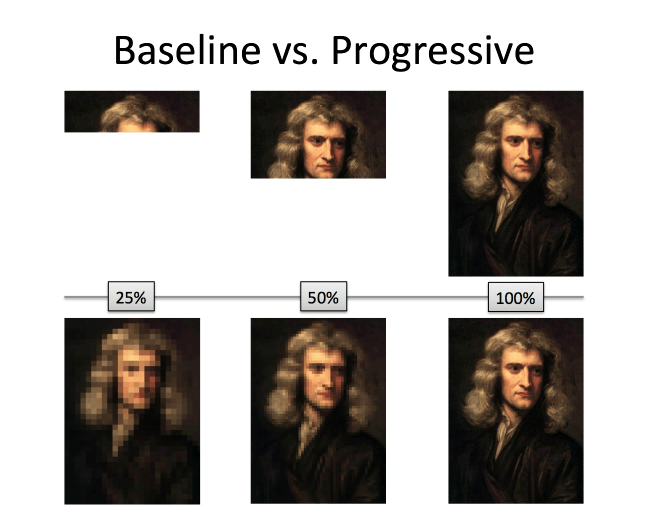
So it looks like you're interested in calculus. Me too, actually -- I want to understand the concepts and make them as natural as arithmetic, and not leave them locked up in some science class (you know, the only place you can "use calculus in the real world").
Here's why this course is different:
Here's two ways to download an image:

You've probably seen both approaches when perusing the internet. Teaching a concept is similar:
The "top-to-bottom" approach seems official. Orderly. Rigorous. And it doesn't work. What, exactly, do you know when you've seen the first 25% in full? A forehead? Do you even know the gender? The age? The teacher has forgotten that you have never seen the portrait so probably don't even recognize it's a forehead!
Progressive rendering (blurry-to-sharp) is a full overview, a rough approximation of what the expert knows, and gets you curious about more. After the overview, we start filling in the details -- and since you've got an idea of what's happening, you're actually curious about learning more! (What's more appetizing: "Let's download the next 10% of the forehead", or "Let's sharpen the entire picture"?).
It's easy to leave behind a disembodied forehead or the first few lines of clouds. Much harder when you see the portrait or realize it was a photo of a surfer.
Realistically, we forget the details anyway (yep, I'll admit it). So, if your memory is going to be hazy anyway, do you want a once-sharp-but-now-hazy forehead or a hazy portrait?
Why are books and courses long? So they can be "impressive" and "worth it". See, since we can't easily judge quality, we'll just quickly measure the length.
What's better: A book that teaches calculus in 100 pages, or 1000 pages? 5 years later, if you remember more calculus from the shorter book, it was better. If you enjoyed calculus more with the shorter book, it was vastly better. You have a hope of revisiting something you enjoyed.
That's my litmus test: a month, a year, 5 years from now, What will you remember (and feel) about calculus?. Will you have a few metaphors that, after exploring, will make things click again? Would you be excited to explain concepts in plain English to your friends and family?
That's my bar. It's not whether you can pass some standardized test (which we will do, in a follow-up). If you aren't permanently upgrading your intuition and your storehouse of analogies, the course failed.
Let's be honest: most courses are focused on getting you through the course. As a prerequisite for some other credential, which is a prerequisite for something else. Ugh. What's the point if we forget it all?
My goal is to explore ideas with you (not "teach" them), and avoid any Emperor's clothes games. If I don't understanding something, I will say so, and something is tricky to understand, I will tell you.
Many teachers present a sanitized version of calculus, fact-after-fact, without mentioning "By the way, this result took math geniuses centuries of debate to resolve. You have the remaining 27 minutes in class to internalize it without issue."
I'm a friend who saw a cool sunset and wants to walk you to the beach. I'll point out the potholes and branches along the way, and if you find a shortcut, tell me. The sunset isn't mine, lecturing at you while blocking the view, it's for us to look at side-by-side.
Let's get started.